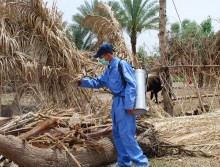“Together we have proven that malaria control efforts work. However, we still we have a tremendous task ahead which calls for extraordinary intensification of efforts, greater commitment and innovation to sustain this progress in line with achievement of the Millennium Development Goals by 2015.” H.E Dr Hawrami said Iraq has successfully extracted itself from the grip of a disease that had been rife in a few countries in the region and more so globally.
According to the Ministry of Health, Iraq has persevered in its long battle with this disease. For example, in the 1960s Iraq faced a very bad outbreak where the number of malaria reported cases increased from 1533 in 1962 to 11,878 in 1965. In 1995 another outbreak peaked at 39,000 cases, especially in the three mountainous areas in the north Iraq due to challenges caused by the security situation and poor inter-sectoral coordination. More recently and notably so, there have been no indigenous reported malaria cases in the country in 2009, 2010 and 2011 to date.
Malaria in Iraq has been widely regarded as a development success story. Dr Syed Jaffar Hussain, WHO Representative of Iraq affirmed that, “Progress in the fight against the disease has been attributed to the leadership of the malaria control programme, bold partnerships, innovative academic thinking, and strong commitment of donors.” He also added that reducing the impact of malaria though communities is key to control of malaria mortality and morbidity.
“The Ministry of Health with the technical support of World Health Organization has completed a Malaria program field assessment last month and recently developed a 2011-2015 strategy to maintain Iraq free of Malaria,” said Dr Buthaina Ghanem, epidemiologist at the WHO-Iraq programme. She further added that the findings of the In-Depth Internal Assessment of the National Malaria Elimination Program during 2010-2011 have been taken into account in the development of upcoming strategic plans.
Dr Hussain reaffirmed the Organization’s commitment to support the Government of Iraq in achieving their health-related national and international goals and urged everybody to commemorate World Malaria Day on April 25th by raising awareness, celebrating the progress and addressing challenges ahead.
PR Iraq Free of Malaria available in English | Arabic
For more information, please contact:
World Health Organization – Iraq









